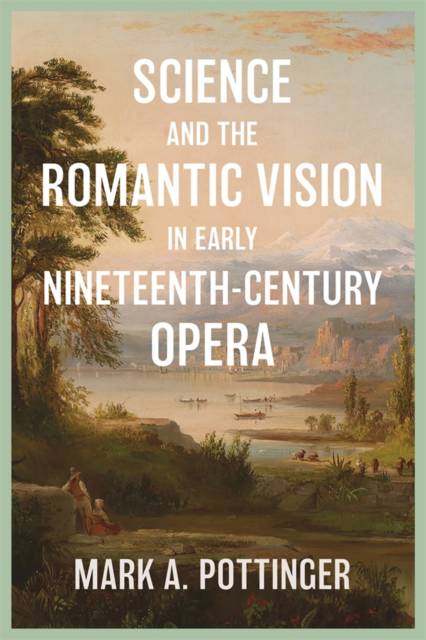
- Afhalen na 1 uur in een winkel met voorraad
- Gratis thuislevering in België vanaf € 30
- Ruim aanbod met 7 miljoen producten
- Afhalen na 1 uur in een winkel met voorraad
- Gratis thuislevering in België vanaf € 30
- Ruim aanbod met 7 miljoen producten
Zoeken
Science and the Romantic Vision in Early Nineteenth-Century Opera
Mark A Mark a Pottinger
€ 193,45
+ 386 punten
Omschrijving
An interdisciplinary study of how early nineteenth-century science and opera articulated a transnational romantic vision of harmony between self and nature, and how this ideal gave way to mid-century realism and social conflict. The end of the Napoleonic era ushered in a transnational outlook for Europe, where the traditional boundaries that separated people, ideas and things were blurred in favour of a unified and cosmopolitan vision for society. The result of this shift created a 'romantic vision', a new way to perceive the imagined potential of the self in correspondence with the infinite reality of the natural world. Early nineteenth-century scientists such as Alexander von Humboldt (earth sciences), Franz Anton Mesmer (mesmerism), Johann Wilhelm Ritter (galvanism) and Frédéric Dubois d'Amiens (hysteria) are explored in this context to see how the romantic vision was reflected in their work and received by society. Seeing opera as a confluence of all the arts and encompassing a similar romantic vision, this book examines three paradigmatic operas that contend with the forces of nature: Weber's Der Freischütz (1821), Meyerbeer's Robert le diable (1831) and Donizetti's Lucia di Lammermoor (1835). In these three highly successful works from separate operatic traditions, the unseen, inner world of nature reveals a wholeness of the self with the divine, showcasing a healthy optimism for society.
The book concludes by discussing Gounod's Faust (1859), a work that highlights the struggle of an early-16th-century scientist and places it against the context of the social revolutions of 1848 and the seminal publication of Charles Darwin's The Origin of Species in 1859. In this post-1850 era, the potential of the unseen reality of nature is cast aside and replaced with the certainty of the everyday-the violence of man against man, the struggle for power and the destruction of nature itself.
The book concludes by discussing Gounod's Faust (1859), a work that highlights the struggle of an early-16th-century scientist and places it against the context of the social revolutions of 1848 and the seminal publication of Charles Darwin's The Origin of Species in 1859. In this post-1850 era, the potential of the unseen reality of nature is cast aside and replaced with the certainty of the everyday-the violence of man against man, the struggle for power and the destruction of nature itself.
Specificaties
Betrokkenen
- Auteur(s):
- Uitgeverij:
Inhoud
- Aantal bladzijden:
- 216
- Taal:
- Engels
- Reeks:
Eigenschappen
- Productcode (EAN):
- 9781837652334
- Verschijningsdatum:
- 6/01/2026
- Uitvoering:
- Hardcover
- Formaat:
- Genaaid
- Afmetingen:
- 156 mm x 234 mm
- Gewicht:
- 480 g

Alleen bij Standaard Boekhandel
+ 386 punten op je klantenkaart van Standaard Boekhandel
Beoordelingen
We publiceren alleen reviews die voldoen aan de voorwaarden voor reviews. Bekijk onze voorwaarden voor reviews.







